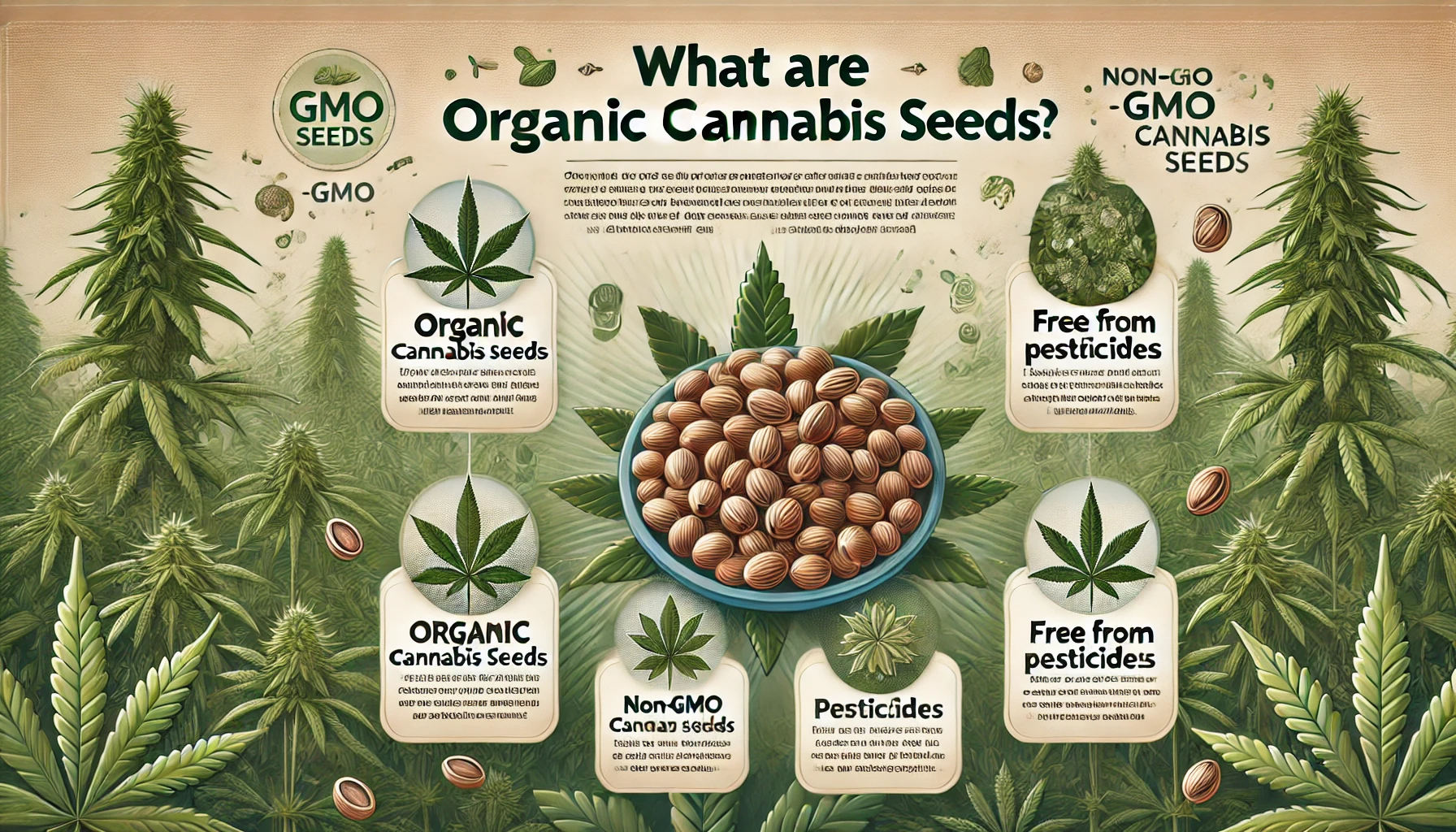Choosing the right seeds for growing cannabis can be a big decision, especially when it comes to deciding between organic and conventional options. Both have their unique advantages and disadvantages, and understanding these can help you make the best choice for your gardening needs. Let’s dive into the world of organic and conventional cannabis seeds and see what each brings to the table.
What Are Organic Cannabis Seeds?
Organic cannabis seeds are grown without synthetic chemicals. This means no synthetic pesticides, herbicides, or fertilizers. Instead, organic farming relies on natural processes and materials like compost, manure, and organic matter to enrich the soil and support plant growth.
The Upsides of Organic Cannabis Seeds
Healthier Plants and Soil
One major benefit of organic cannabis seeds is the health of both the plants and the soil. Organic methods boost soil fertility and structure, leading to stronger, more resilient plants. Healthy soil can better hold nutrients and water, creating a stable environment for cannabis to flourish.
Environmentally Friendly
Organic farming is kinder to the environment. By avoiding synthetic chemicals, it reduces pollution and helps protect local ecosystems. This sustainable approach supports biodiversity and maintains a balanced ecosystem.
Better Flavor and Aroma
Many believe that organically grown cannabis has a superior flavor and aroma. Without chemical residues, the plant’s natural terpenes fully develop, offering a richer and more authentic taste and smell. For the best quality organic cannabis seeds, it’s worth exploring options from the top seed banks in the USA.
Growing Market Demand
There’s a growing demand for organic products, including cannabis. People are increasingly looking for organic options for their health benefits and lower environmental impact. By growing organic cannabis, you can tap into this market, potentially boosting your sales and building customer loyalty.
The Downsides of Organic Cannabis Seeds
Lower Yields
A common drawback is that organic cannabis seeds can produce lower yields compared to conventional seeds. Organic farming methods are often less intensive, resulting in fewer buds per plant. This can be a disadvantage for growers aiming to maximize their harvest.
Higher Costs
Organic farming can be more expensive due to the cost of organic inputs and the labor-intensive nature of the practices. These higher costs might make organic cannabis more expensive to produce, which could be reflected in higher prices for consumers.
Pest and Disease Challenges
Managing pests and diseases organically can be tougher. Organic farmers rely on natural predators, crop rotation, and other non-chemical strategies, which can be less effective and more time-consuming than synthetic solutions.
What Are Conventional Cannabis Seeds?
Conventional cannabis seeds are produced using modern agricultural techniques that often involve synthetic chemicals. These methods aim to maximize yields and efficiency.
The Upsides of Conventional Cannabis Seeds
Higher Yields
Conventional seeds usually result in higher yields. The use of synthetic fertilizers and advanced growing techniques can significantly boost plant growth and bud production, which is a big plus for commercial growers.
Cost-Effective
Conventional farming methods can be more cost-effective due to the availability of synthetic inputs and mechanized farming practices. These efficiencies can lower overall production costs, making conventional cannabis more affordable.
Easier Pest and Disease Control
Synthetic pesticides and herbicides simplify pest and disease management. These chemicals quickly and effectively eliminate threats, reducing the risk of crop loss and ensuring consistent harvests.
The Downsides of Conventional Cannabis Seeds
Environmental Impact
The use of synthetic chemicals can harm the environment. These substances can leach into soil and water, causing pollution and disrupting local ecosystems. Conventional farming can also deplete soil nutrients over time, reducing soil health.
Potential Health Risks
There are concerns about the health risks of consuming cannabis grown with synthetic chemicals. Residual pesticides and herbicides can remain on the plant and be ingested by users. Even with regulations to limit these residues, some consumers prefer to avoid them altogether.
Flavor and Aroma
Some growers and consumers feel that conventional cannabis lacks the depth of flavor and aroma found in organic cannabis. Chemical residues can interfere with the plant’s natural terpene profile, potentially diminishing the overall sensory experience.
Making the Right Choice
Consider Your Goals
Think about what you want to achieve as a grower. If sustainability and meeting organic market demands are your priorities, organic seeds might be the way to go. If maximizing yields and cost-effectiveness are more important, conventional seeds could be a better fit.
Evaluate Your Resources
Look at your available resources, including budget, labor, and access to organic or conventional inputs. Organic farming often requires more effort, while conventional farming may need more financial investment in chemicals and equipment.
Understand Your Market
Know your target market. If there’s a strong demand for organic cannabis in your area, growing organic can give you a competitive edge. If your consumers are more price-sensitive, conventional cannabis might be more appealing.
Conclusion
Choosing between organic and conventional cannabis seeds depends on your goals, resources, and market demands. Organic seeds offer environmental benefits and superior flavor but come with higher costs and lower yields. Conventional seeds provide higher yields and easier pest control but have environmental and potential health drawbacks. By carefully considering these factors, you can make an informed decision that best suits your cannabis growing needs.
